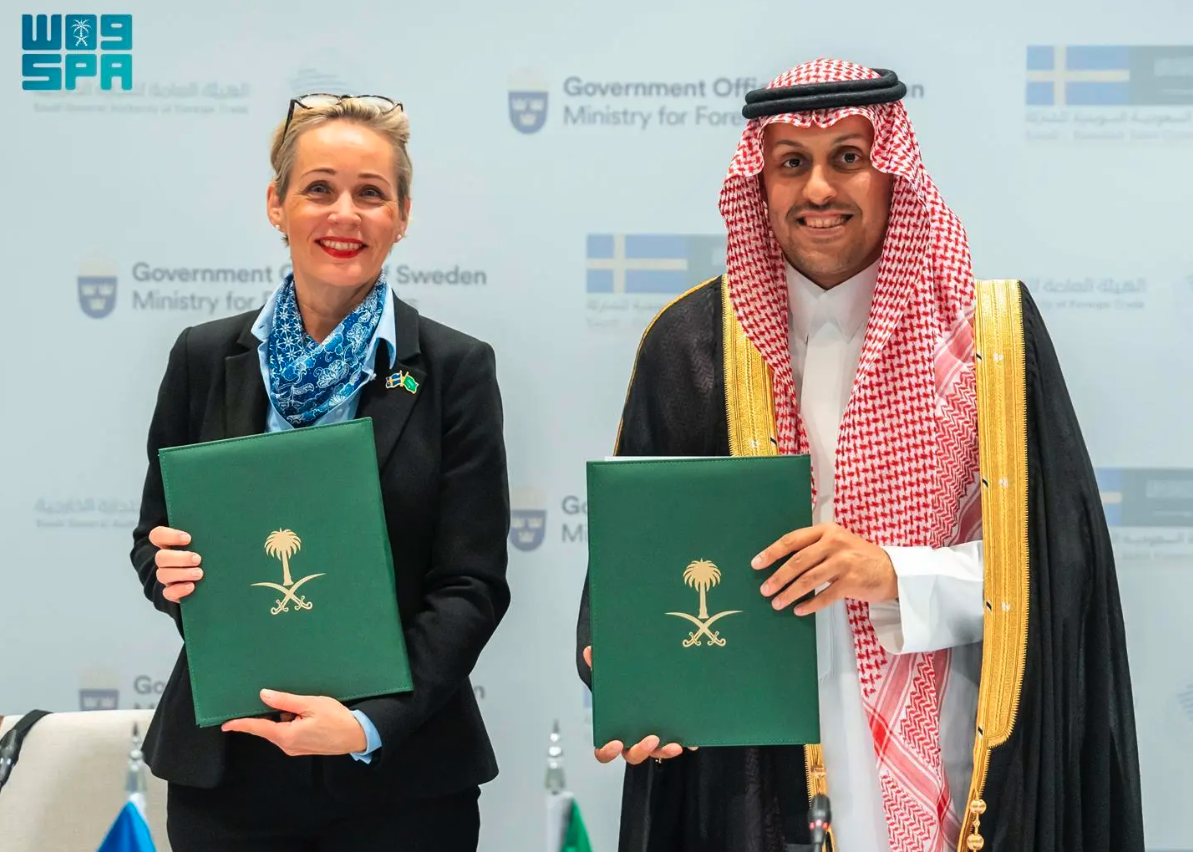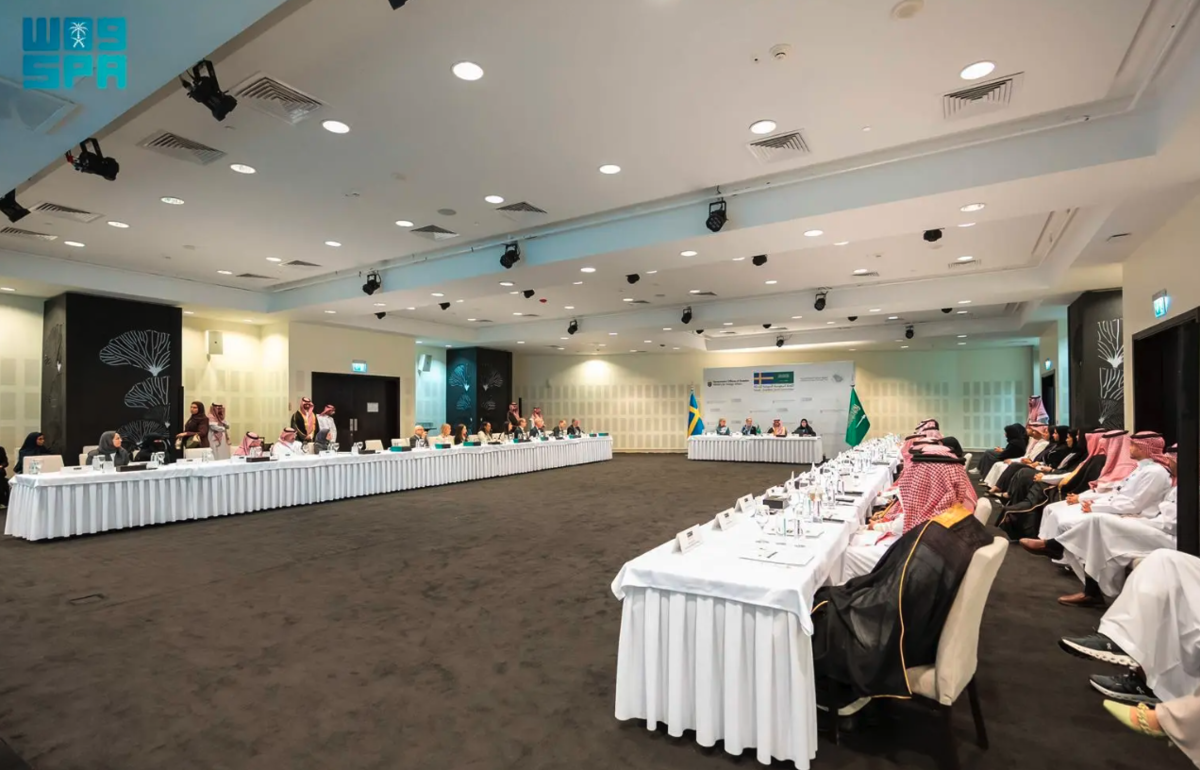RIYADH: Up to 77 percent of Swedish companies operating in Saudi Arabia plan to increase their investment over the next year, according to a top official from the European country.
In an interview with Arab News, Director General of Trade Policy at the Swedish Ministry of Foreign Affairs Camilla Mellander cited a recent study by Business Sweden as she explained the confidence companies from her country have in the Saudi market.
Saudi Arabia is Sweden’s largest trading partner in the Middle East and North Africa region, with a 72 percent rise in commerce since 2018.
Mellander was present in the Kingdom to attend the third meeting of the Saudi-Swedish Joint Committee in her role as a co-chair – an event that came just days after her country’s Minister for Foreign Trade, Benjamin Dousa, met with his Saudi counterpart Minister of Commerce Majid Al-Qasabi at the Future Investment Initiative in Riyadh.
Mellander told Arab News that there are around 60 Swedish companies currently active in Saudi Arabia, and it is 77 percent of these that plan to up their investments in the Kingdom.
“Interestingly, 100 percent of the small or medium sized companies surveyed reported wanting to increase their investment. This really speaks to the confidence of Swedish companies in the Saudi market and the potential they see,” she added.
The director general went on to say that Swedish companies seek to establish long-term partnerships and investments in a demonstration they are reliable partners.
“Some Swedish companies have been active in Saudi Arabia since as early as the 1950s. Around 40 percent of Swedish companies currently working in Saudi Arabia have established or are looking to establish their regional office in the country,” Mellander said.
“The reforms that Saudi Arabia has undertaken as part of Vision 2030 have great potential not only to attract companies but also more foreign direct investments. Today, the EU is the largest source of foreign direct investment in Saudi Arabia – 66 percent in 2022. This also shows the strong confidence of European investors in the Saudi Arabian market and business climate,” she added.
Talking about how the two countries can facilitate SMEs participation in bilateral trade and investment, the director general said: “I am very excited to participate in the BIBAN Forum ... and to personally take stock of the possibilities for cooperation within the field of SMEs.”
She added: “One area with great potential is the collaboration between Swedish incubators and their counterparts here in the Kingdom. Both Sweden and Saudi Arabia share the priority to support our young entrepreneurs. We need to coach them so that they can shepherd their innovations from ideas to commercial success.”

Mellander with the Deputy Governor for International Relations at the Saudi General Authority of Foreign Trade Abdulaziz bin Omar Al-Sakran. SPA
Closer working
Reflecting on areas of growth between the two countries, the director general cited transportation, industrial equipment, health, and technology as key sectors.
Mellander said the meeting of the Saudi-Swedish Joint Committee was an opportunity for the two countries to identify new areas of mutual interest to deepen relations in areas where there are already existing ties.
When it comes to cultural exchange programs and initiatives that contribute to strengthening economic ties between Sweden and Saudi Arabia, Mellander said that scholarships for Swedish students that wish to study in the Kingdom were one of the discussion items during the Joint Committee.
“We are also looking into the possibility for internships at Swedish companies for Saudi students. This adds to the already existing programs, such as for specialist training of doctors provided at some of our university hospitals. I hope that the new initiatives will help to strengthen the economic and people-to-people ties between Sweden and Saudi Arabia,” Mellander said.
With regards to promising investment opportunities for Swedish companies in Saudi Arabia and vice versa, the director general said that firms from her country are well positioned to contribute to sectors of importance to the realization of Vision 2030 and the giga-projects.
“Nearly half of Swedish businesses in Saudi Arabia are currently engaged in at least one giga-project or other core parts of Vision implementation,” Mellander said, flagging up the involvement of firms such as Ericsson, Sandvik and Volvo Trucks.
Swedish ‘optimism’
Mellander stressed that according to the latest global business climate report made by Business Sweden, the Kingdom stands out as one of the markets with the most favorable business climate for firms from her country.
“Swedish companies report a very high optimism when it comes to the Saudi market. The regulatory changes under Vision 2030 have been very positive. As part of our Swedish-Saudi partnership this must also be communicated to Swedish companies which have a lot to offer to Saudi Arabia. Here, formats like the Joint Committee can be very valuable,” she said.
“At the same time, Swedish companies report that one regulatory hurdle for them in Saudi Arabia is the rapid pace of regulatory changes – it is simply difficult to keep up with new legislation. Another challenge is the access to skilled labor,” the director general added.
When it comes to the areas of digital cooperation between the two sides, Mellander noted that Saudi Arabia is well known among Swedish companies for its high speed and connectivity rate.
“One obvious key area for digital cooperation is the continued development of the infrastructure, the backbone of digital communication. Swedish companies are not only at the forefront of 5G technology and the development of 6G, they can also offer new and innovative applications to increase productivity and efficiency. In addition, they invest in R&D here – for instance, Ericsson is cooperating with KAUST (King Abdullah University of Science and Technology) on 6G development,” she said.
During her time in Saudi Arabia, Mellander visited renal care provider Diaverum to learn more about the Kingdom’s healthcare system and possible avenues for collaboration with Swedish firms.
“A large group among them recently took part in the Global Health Exhibition (in Riyadh), including the newly formed healthcare consortium, and I know they had many productive meetings that are now being followed up,” she added.
With regards to financial cooperation, the director general underlined that Sweden has a very strong export credit system with internationally competitive interest rates and flexible conditions.
“They are already working with banks, Saudi and Swedish actors, to support major investments in the Kingdom, and the interest for their solutions is growing rapidly. Therefore, the Swedish Export Credit Agency, EKN, signed a memorandum of understanding for collaboration with Saudi EXIM this year. Next week, the board of the Swedish Export Credit Corporation, SEK, will be visiting Riyadh to learn more,” Mellander said.
Saudi-Swedish Joint Committee

The Saudi-Swedish Joint Committee held its third session in Riyadh from Nov. 4-5. SPA
During the two-day long Saudi-Swedish Joint Committee meeting, delegates agreed to implement 45 initiatives to address challenges and obstacles to bilateral trade in areas including investment, energy and technology, as well as industry, education and health.
Tourism and sports were also discussed, accord to the Saudi Press Agency.
Deputy Governor for International Relations at the Saudi General Authority of Foreign Trade Abdulaziz bin Omar Al-Sakran noted the importance of overcoming obstacles that may hinder the flow of investment and trade between the Kingdom and Sweden.
In 2023, the trade volume between Saudi Arabia and Sweden reached approximately $1.7 billion.
The main exports from the Kingdom included plastics and their products, machinery, and mechanical appliances and parts, while key Swedish imports consisted of iron and steel products as well as pharmaceuticals.





























